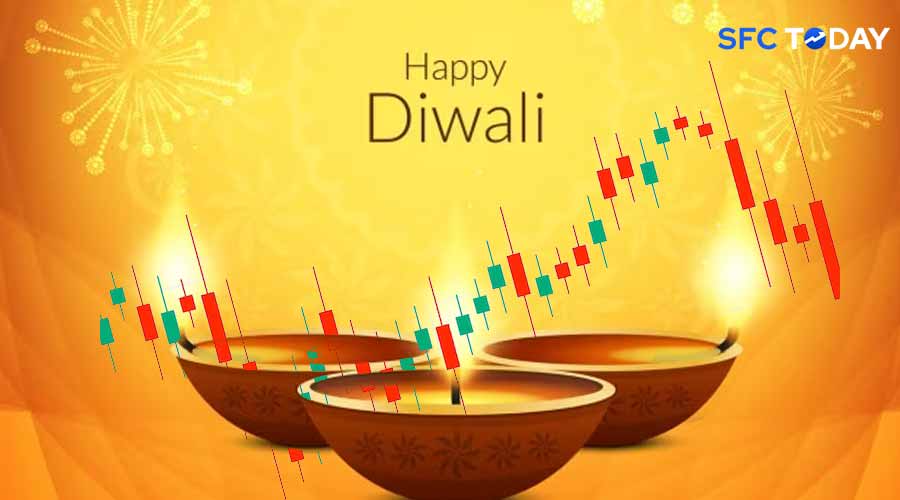Curious if the stock market will stay open during this Diwali season
This year, Diwali festivities kick off with Dhanteras on October 29, 2024. Observed as an official holiday in various cities across India, Dhanteras brings the focus on wealth and prosperity, drawing families and investors alike to worship Dhanvantari, the deity of health and healing. With the holiday season setting in, one question remains on investors’ minds: Will the stock market remain open on Diwali, or will trading be halted?
Post-Dhanteras, the market will observe a brief pause, remaining closed until November 1, 2024. This period of closure allows traders and investors to celebrate Diwali and participate in a special trading session known as Muhurat Trading. This unique session marks the beginning of the financial new year in Hindu tradition and carries significant cultural importance.
The Significance of Muhurat Trading on Diwali
Muhurat Trading is a time-honored tradition on Diwali, celebrated during the Laxmi Puja, an auspicious time believed to usher in wealth and prosperity. Scheduled for a short duration, this session provides traders and investors an opportunity to make investments during what is considered a favorable period for wealth accumulation.
Historically, the Muhurat Trading session is a time when many traders, from institutional investors to retail participants, make fresh purchases or adjust their portfolios. The belief is that investing during this auspicious time brings prosperity and sets a positive tone for the upcoming financial year. New settlement accounts are often created on this day, symbolizing the start of fresh financial journeys.
Why Muhurat Trading is Important
Muhurat Trading offers an ideal time for investors to set intentions for financial growth and stability in the coming year. Many traders and investors view this session as an opportunity to start their investment journey with the blessings of Goddess Lakshmi, the deity of wealth and prosperity. This special session allows seasoned investors to expand their portfolios, either by introducing new stocks or by adding to existing positions. It also holds appeal for newcomers, as it aligns the practical aspects of investing with the symbolic aspirations of prosperity and growth.
Structure of the Muhurat Trading Session
Muhurat Trading is a structured session designed to facilitate smooth transactions within a limited time. This session is divided into several key segments, each serving a specific purpose to ensure organized trading activity:
Block Deal Session
During this initial session, two parties agree to buy or sell a specific security at a predetermined price. This information is then relayed to the stock exchange, ensuring transparency and adherence to regulatory guidelines.
Pre-Open Session
In this segment, the stock exchange determines the equilibrium price for listed securities. This session generally lasts for around eight minutes, during which the opening prices are established based on demand and supply dynamics.
Normal Market Session
The core trading period of the Muhurat session, this one-hour window allows most of the trading activity to take place. During this time, investors place trades across various securities, taking advantage of the auspicious occasion.
Call Auction Session
This session focuses on illiquid securities, enabling trading in stocks that typically do not see high volumes. Illiquid securities meet specific exchange criteria, making them eligible for trade during this segment.
Closing Session
In the final segment, traders can place market orders at the closing price. This ensures a smooth wrap-up of trading activities, allowing participants to finalize their positions.
Historical Impact of Muhurat Trading
Over the years, Muhurat Trading has become more than just a symbolic event. It has transformed into a session that often witnesses positive investor sentiment and a temporary boost in market volumes. In many cases, the stock market has observed modest gains during Muhurat Trading, as the auspicious occasion attracts both individual and institutional participation.
Analysts often track the performance of the market during Muhurat Trading to gauge investor sentiment. The brief trading period, coupled with the festive atmosphere, can sometimes lead to heightened optimism and a surge in specific sectors, particularly those tied to consumer goods, gold, and luxury items. However, the session’s limited duration means that market volatility remains manageable, with participants generally focusing on longer-term holdings rather than speculative trades.
Sectors Likely to Benefit During Muhurat Trading
Several sectors traditionally gain attention during the Muhurat Trading session due to their relevance to the Diwali season and the broader themes of prosperity and well-being:
Consumer Goods
The festive season boosts demand for consumer goods, particularly those related to household items, appliances, and personal care. Companies operating in this sector often see increased buying interest during Muhurat Trading as investors anticipate strong quarterly results.
Jewelry and Gold
Gold holds immense cultural significance during Diwali, with many people purchasing gold as a symbol of prosperity. Companies involved in gold trading, jewelry, and mining often experience a spike in stock activity during Muhurat Trading as investors align their portfolios with seasonal demand.
Automobiles
Diwali is a popular time for new vehicle purchases. The automotive sector may see increased trading activity, with investors anticipating strong sales figures. Stocks of automobile manufacturers, auto component suppliers, and related companies often see a surge during this time.
Banking and Financial Services
The beginning of the financial new year is an ideal time for individuals to assess their investment and savings goals. Banking and financial services companies typically see heightened interest, as investors look to financial institutions for wealth management solutions and loans to fund festive spending.
Key Takeaways for Investors on Diwali 2024
For investors considering their options on Dhanteras and Diwali, it’s essential to understand the market dynamics during this period. Dhanteras provides a regular trading day, allowing investors to make strategic adjustments to their portfolios ahead of the Diwali festivities. Muhurat Trading, on the other hand, is a unique session that blends cultural significance with financial aspirations, making it a special occasion for investment.
Investors often approach Muhurat Trading with a mix of traditional sentiment and practical financial goals. Given the positive outlook surrounding Diwali and the alignment with wealth-related aspirations, Muhurat Trading allows participants to embrace a hopeful mindset for the financial year ahead. While the trading session itself is brief, the symbolic value and the optimism associated with this time make it an impactful moment in the Indian financial calendar.
Diwali 2024 brings with it the usual anticipation and cultural significance, coupled with unique opportunities for investors. With a brief pause until November 1, market participants have a clear window to plan their trades. Muhurat Trading on Diwali, particularly, remains a cherished occasion, blending financial strategy with traditional values. As investors align their portfolios with the spirit of prosperity, this season reinforces the unique interplay between finance and culture in India’s stock market landscape.











